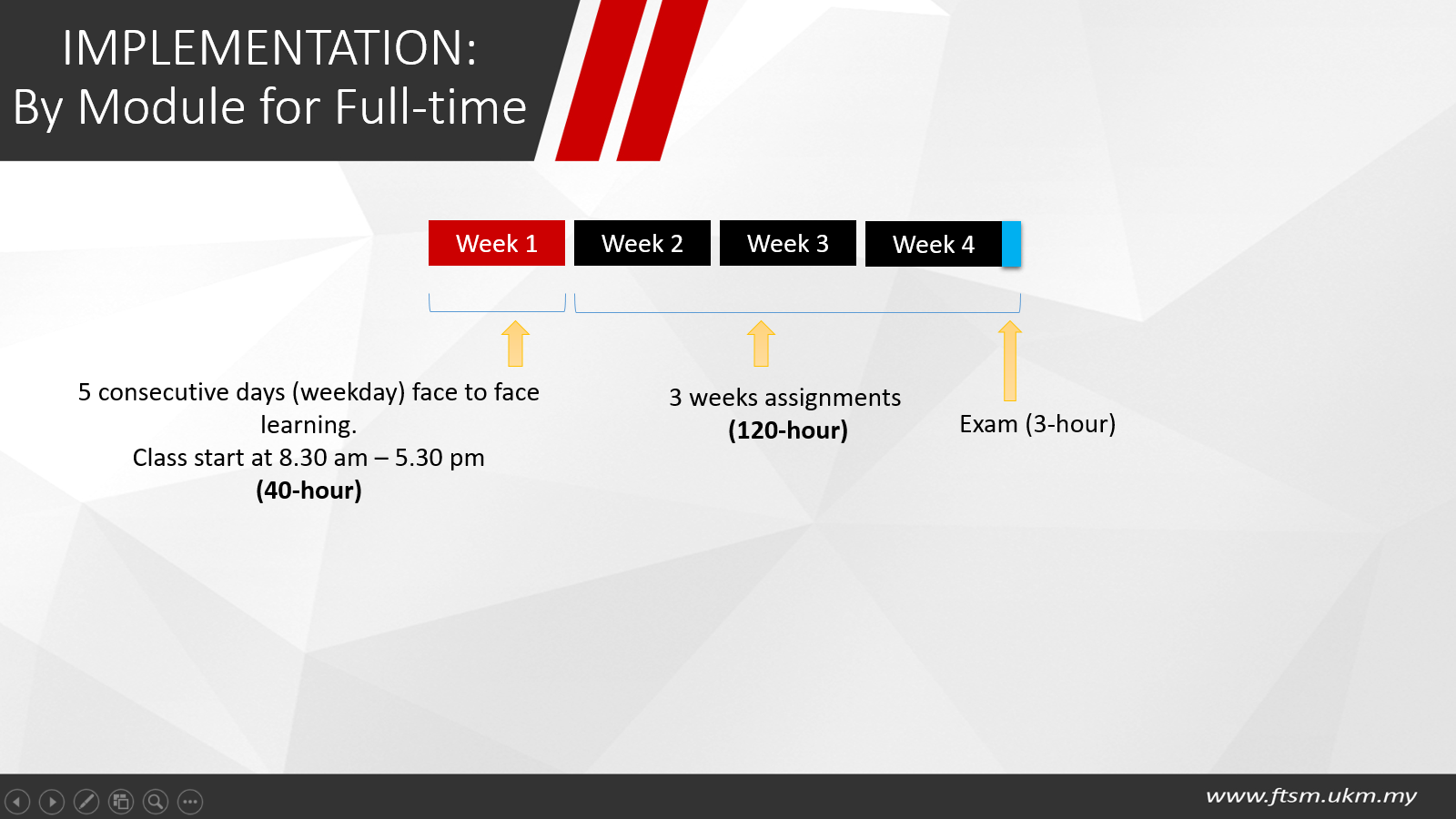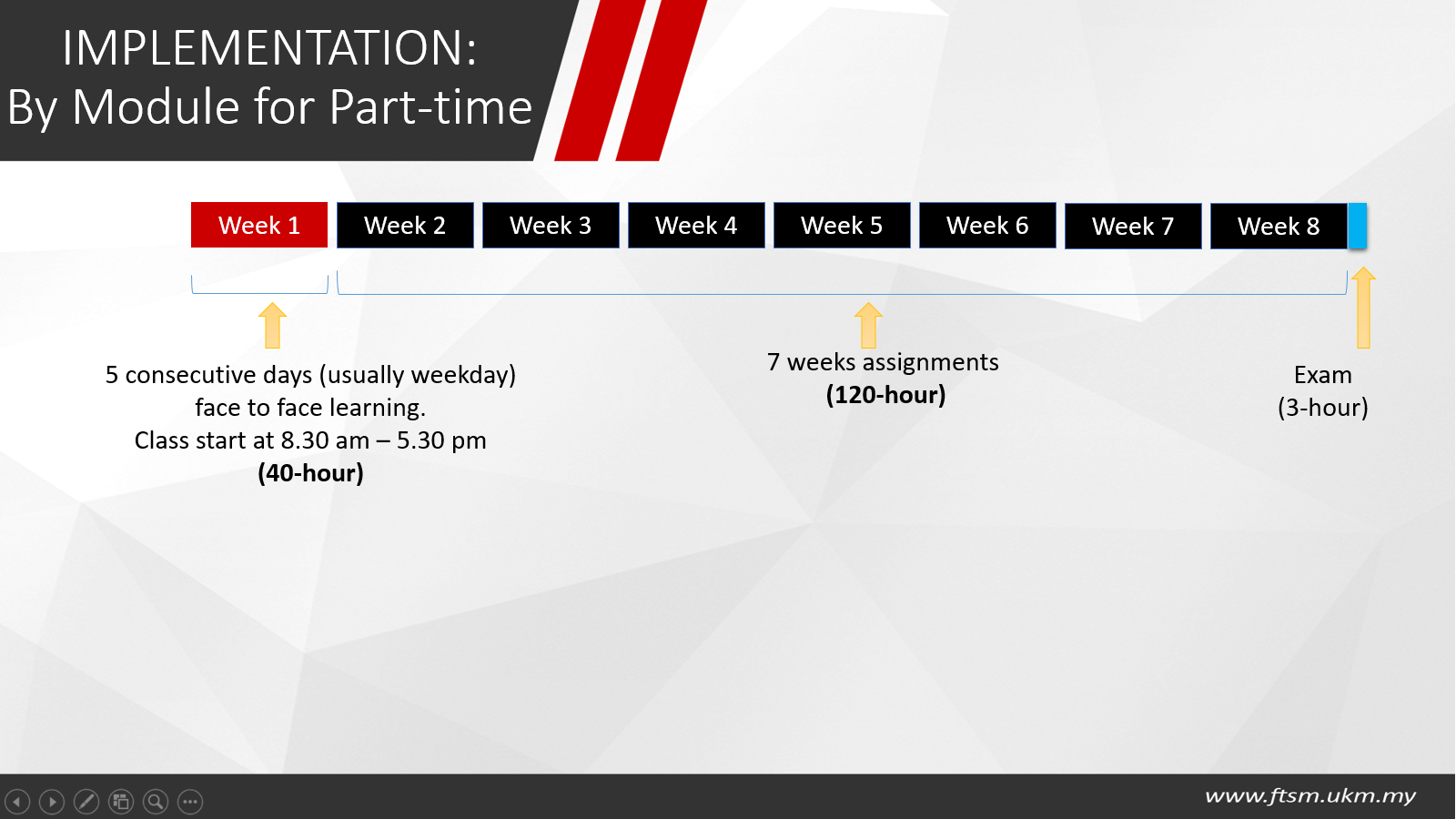
Faculty of Information Science and Technology in Universiti Kebangsaan Malaysia offers various computing programmes. However, the Master of Health Informatics is uniquely designed for Medical or Health Science professionals.
We team with Faculty of Medicine and Faculty of Law to ensure the best knowledge delivery.
Mode of Study
Accreditation Status by
Admission Requirement
- Bachelor's Degree in Science, Technology, Medicine, Health Sciences, Social Sciences or other fields that related from the University Malaysian national or anywhere institute of higher learning with obtain a Grade Point Average and Cumulative (CGPA) ≥2.75; OR
- Bachelor's Degree in Science, Technology, Medicine, Health Sciences, Social Sciences or other fields that related to obtaining the Average Grade and Cumulative Value (CGPA) ≥2.50, may be admitted subject to minimum 5 years of work experience in relevant fields; OR
- Other qualifications equivalent to a degree Bachelors and have qualifications other or experience, which is approved by the Senate OR
- Other relevant professional qualifications in medical or health sciences recognized as equivalent to honours degree by the UKM Senate.
TOEFL/IELTS/MUETS/CEFR
For international candidates, requirements for English Language is:
- minimum 550 (PBT) / 46-59 (iBT) score for the Test of English as a Foreign Language (TOEFL) OR
- 5.5 for the International English Language Testing System (IELTS) OR
- Band 3 for Malaysian University English Test (MUET) OR
- level B2 for the Common European Framework of Reference for Languages (CEFR/CEFRL)
as a prerequisite for entry into graduate programmes at FTSM.
Language Requirements
Malay Language Courses (4 units)
All international students are required to follow two (2) Malay language courses equivalent to 4 units offered by the Citra Centre. Exemptions can be given to candidates who have taken and passed Malay language courses organized by other bodies recognized by the UKM Senate.
Programme Structure
Learning Outcomes
The programme is designed to produce graduates who will be able to:
- Apply health informatics to support decision making, knowledge management and strategic planning in order to produce an efficient health care system.
- Evaluate the capability, feasibility and suitability of information systems to be integrated into the health services
- Practice lifelong learning in order to equip themselves with latest knowledge and technology in the area of health informatics.
- Act professionally and ethically as well as having a clear understanding of the social, economic and cultural impact as the result of adopting health informatics
Structure And Content
| Structure | Course Credit | Course |
| Compulsory | 20 credits (equivalent to 5 courses) |
|
|---|---|---|
| Electives | 8 credits (equivalent to 2 courses) |
|
| Project | 12 credits |
|
| Total | 40 Credits |
Duration of Study
- Full Time : 1 - 2 years
- Part Time : 2 - 4 years
Teaching Approach
By considering enthusiastic executives as our main audience, the courses are designed in such a way that face to face learning is done in 5 full days which include active learning, lab activities, discussion and case studies. Whilst the assignments need to be completed in the next 3 weeks for Full-time or 7 weeks for Part-time students.


The ongoing assessment contributes to 60% of the overall marks and the remainder is from final examination (40%).
List of Courses
TS6024 Information Modeling and Databases
This course introduces database concepts and technologies, and provides the practical foundation in data modelling, database development, structured query language (SQL), database application programming, and database administration. This course is designed for students with little or no prior experience in using databases.
TS6034 Information Technology and Its Environment
This course is designed to introduce the basic concepts of Information Technology and its applications to students without a technical background. The course starts with the basics such as the parts of a computer and the different kinds of software, including file systems, databases, computer networks, and the web. Students then learn about programming concepts and integrating applications with databases.
TY6024 Health Informatics
This course is designed to introduce the student to fundamental concepts, principles, applications, and processes in Health Informatics. The course offers a basic but comprehensive introduction to major issues and developments in the field. It provides a framework to understand the types of information systems prevalent in healthcare organizations. Student will be exposed to specific concepts related to electronic medical records (EMR), health data and standards. Upon completion of the course, student should be able to explain the key information requirements for effective health information management and decision support, and apply these competencies to real-world problems.
TY6044 Enterprise Architecture for Health Information Systems
This course aims to introduce the basic level of knowledge about the Enterprise Architecture (EA) and it related subjects for Health Informatics System(HIS) development. It will begin with an introduction to enterprise client-server computing and its components. Then, it covers the understanding of EA as a key area of enterprise engineering that provides the coherence of health institution operations to its mission and goals, the actuality of current state of an institution, transparency of its processes, controlled transformation of its asserts, and increase performance using information technologies (IT). The course incorporates the basics of business-process modelling, and creating information and technology architectures. The basics in enterprise engineering i.e. main models and methodologies of enterprise building are also discussed. This course will provide the participants with the skills for the analysis, development, testing, problem solving and commissioning of an HL7 project. Other standards such as DICOM, GS1, SNOMED, LOINC, IHE, NEHTA, and XML are explored. Last but not least the course embraces the Service Orientation during EA building as a source of sustainable competitive advantage (CA).
TY6054 Management of Information Technology
The course is intended to cultivate and exercise knowledge pertinent to various types of IT management in organisation including policy, strategy, and IT planning. The following topics will be covered in the course: functional management of IT department; IT acquisition, IT investment and measurement, and organisational IT planning: direction, information requirement, and implementation.
TY6034 Analysis and Design of Health Information Systems
This course is prepared to expose student to health information systems development environment based on system development life cycle. Through this exposure, student will obtain in depth knowledge on analyzing and designing health information systems in supporting operation and business requirement. Students will learn to develop simple prototype of health information systems systematically based on the conducted analysis and design. In this course, students will be able to learn how to evaluate the existing health information system based on a standard evaluation method.
TY6064 Law and Ethics in Healthcare
The aim of this course is to equip the student with the knowledge and skills necessary to recognize legal and ethical issues that arise in healthcare practice and to be able to evaluate the situations that may have legal or ethical implications. In addition, the students are expected to know when to seek legal or ethics committee counsel and to have an understanding of the implications of health care law on their own decision making. Topics include health care law, professional standards, negligence and malpractice, medical records and governing bodies that regulate aspects of health services delivery.
TY607C Project
12 credits Health Informatics project
Course Schedule
How To Apply
We have one (1) intake per year which is September (Semester 1) intake. Please register via online application through here.
Fees
RM24,000 for LOCAL candidate
- Complete program fee is RM24,000 which will be paid in THREE (3) installments (FULL-TIME) on per semester basis :
- 1st Semester : RM9,000
- 2nd Semester : RM7,500
- 3rd Semester : RM7,500
- FOUR (4) installments (PART-TIME) on per semester basis :
- 1st Semester : RM7,200
- 2nd Semester : RM5,600
- 3rd Semester : RM5,600
- 4th Semester : RM5,600
RM32,000 for INTERNATIONAL candidate
- Complete program fee is RM32,000 which will be paid in THREE (3) installments (FULL-TIME/PART-TIME) on per semester basis :
- 1st Semester : RM12,000
- 2nd Semester : RM10,000
- 3rd Semester : RM10,000
FAQ
Am I eligible to apply for this program?
Please check at the Admission Requirement page, where you must have a bachelor degree in the relevant area. Working experiences in the relevant area are considered too.
How much does it cost?
RM24,000 for LOCAL candidate
- Complete program fee is RM24,000 which will be paid in THREE (3) installments (FULL-TIME) on per semester basis (1st Semester : RM9,000 • 2nd Semester : RM7,500 • 3rd Semester : RM7,500); OR
- FOUR (4) installments (PART-TIME) on per semester basis (1st Semester : RM7,200 • 2nd Semester :RM5,600 • 3rd Semester :RM5,600 • 4th Semester : RM5,600)
RM32,000 for INTERNATIONAL candidate
- Complete program fee is RM32,000 which will be paid in THREE (3) installments (FULL-TIME/PART-TIME) on per semester basis (1st Semester : RM12,000 • 2nd Semester : RM10,000 • 3rd Semester : RM10,000)
When is the intake?
We have one (1) intake per year which is September (Semester 1) intake. Please apply via online application system (eSpeed).
Is there any funding or sponsorship that I can apply?
Local candidate can apply for PTPTN or funding through KWSP.
What is the medium of instruction?
We use English
When is our first class?
Student under the February intake will start their class in March meanwhile September intake start in October. Class start from 8.30 am to 5.30 pm. Breakfast, lunch and evening break are provided too.
Any enquiry please contact
- Masters by Module Coordinator
- sarjanakhas.ftsm@ukm.edu.my
- +6 03 - 8921 6176